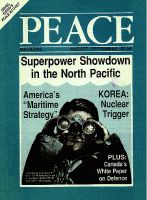
Peace Magazine Aug-Sep 1987, page 29. Some rights reserved.
Search for other articles by Kay Macpherson here
The latest in a series of planned discussions with NATO officials was held in Brussels on June 1st 1987. Women representing the NATO countries, after a day of preparation and discussion together, met each with their own NATO ambassadors, and later with Lord Carrington, the Secretary-General of NATO. Last November's Athens meeting of sixty women leaders from 35 countries had made plans for following up the "Meaningful Summit", and for presenting alternatives to the threats of force and nuclear war which dominated NATO's policies throughout its existence.
The group, which included M.P.s, members of the European Parliament, experts on defence strategies and peace activists, was led by Margarita Papandreou of Greece. Questions were prepared before the interviews and the answers compared later. The results were reviewed at a press conference. The Women wanted NATO decisions to be made by politicians accountable to the people of Europe and North America, with less secrecy and fewer unilateral decisions taken by the United States. The women seek alternative ways to end the confrontational arms race, with efforts to be made by both alliances acting with other countries to bring about solutions which depend on neither nuclear or conventional weapons.
Immediate objectives of the women as first steps toward this goal were:
The women argue that political, economic and other conditions have changed fundamentally since NATO was formed in 1949. The women say that NATO's methods -- threats of force, show of strength, nuclear escalation and the artificial division of nations into "friends" and "enemies" must be changed before the catastrophic consequences catch up with the whole world.
Two women represented Canada -- Madeleine Gilchrist, who had attended the Athens "Meaningful Summit" meeting and others in Geneva and Boston, and Kay Macpherson. They represented Voice of Women and the National Action Committee on the Status of Women. The Canadian Ambassador
NATO, Gordon Smith and his Military Adviser, General Pellerin, talked about establishing trust, but gave excuses for NATO not taking even a first step to demonstrate any commitment to this goal. "Verification" was once more cited as a stumbling block. Later the women learned that an offer had been made by the Five Continent, Six Nation Initiative group with Swedish research and help, to provide neutral monitoring and inspection for the reduction of nuclear and other weapons. NATO apparently has not responded to this offer.
In summing up the women's reactions to the meetings, Margarita Papandreou, Cora Weiss of the United States, Scilla McLean of Britain and others made the point that NATO appears to be an obsolete organization, still beating the old drum of "negotiating from strength" and keeping peace by being heavily armed. It takes unilateral action without reference to the democratic process, with decisions and agreements often remaining secret or hidden from public view. Each nation has an independent voice with no authority vested in the Secretary-General ("Je n'existe pas" said Lord Carrington). In calling for greater trust and confidence building and for multilateral negotiations, Cora Weiss summed up the dilemma, which, in Canada, has hecome glaringly obvious with the publication of the White Paper on Defence. "It's hard to take the toys away from the boys." But Women for a Meaningful Summit and millions of women round the world plan to do so.
Kay Macpherson belongs to Voice of Women.

Peace Magazine Aug-Sep 1987, page 29. Some rights reserved.
Search for other articles by Kay Macpherson here